The 10th edition of the weeklong Taif Rose Festival concluded Saturday on a high note in the presence of flower lovers from all over the Kingdom, including westerners, Saudis and citizens of the neighboring Gulf states.
The festival, held at King Faisal Park, was inaugurated jointly by Makkah Gov. Prince Mishaal bin Abdullah and Prince Sultan bin Salman, chairman of the Saudi Commission for Tourism and Antiquities (SCTA).
Many visitors bought rose oil and rose water, according to organizers who said that this year saw an increase in rose production and also visitors in the 10-year history of the festival. “The response was overwhelming,” Eid Al-Swat, chief organizer of the festival, told Arab News. He said that there were requests from people to extend it for three days but they could not do so. He added that several European residents from Jeddah, Riyadh and Dammam also visited the festival.
He said that during week days the number of visitors was around 5,000 to 8,000. There were several recreational activities for children on the sidelines of the Festival. Every year Taif Municipality and the Saudi Commission for Tourism and Antiquities coordinate with local farmers to organize the festival, which is visited by both local and international tourists, he added.
Al-Swat said, “We have celebrated nine years of allegiance to Custodian of the Two Holy Mosques King Abdullah in a floral method. We prepared a rose carpet with 111,000 flowers of 50 various varieties of roses stretching 750 square meters to welcome Prince Mishaal and Prince Sultan bin Salman.”
Ahmed Al-Jaied, another prominent official of Rose Festival, said, “Rose farms have spread from the more well-known areas of Al-Shafa and Al-Hada to many highland areas surrounding Taif governorate which has 860 farms producing more than 300 million roses annually. There are also 50 distilling plants for production of rose water and rose oil.”
He said that the output of distilling plants producing natural perfumes and rose oil of different grades, this year, is between 18,000 and 20,000 tolas of pure rose oil, which is sold at prices ranging from SR1,500 to SR2,000 per tola.
The bottles of ‘Al-Aroos,’ or first-extract rose water, are sold for SR40 each, while ordinary rose water is sold for SR20 a bottle throughout the year. Taif rose water is characterized by its sweet smell and rich flavor compared to imported rose water.
The extraction of rose oil is done at special traditional distilling plants. The roses are first cooked in large pots, each with a capacity of between 10,000 and 20,000 roses.
When the vapors rise from the cooking pot, they are condensed into droplets through a cooling pipe known locally as Al-Kou’, which carries the distilled water and rose oil from the pipe to Al-Talqiah, a vessel made of glass, which comes in different sizes.
Rose Festival in Taif delights one and all
Rose Festival in Taif delights one and all

High-end design with luxury service: The Jeddah Edition

JEDDAH: With its sleek, contemporary design that combines modern luxury with understated elegance, it’s no surprise that the Jeddah Edition won Best Hotel Design at last month’s Saudi Commercial Interior Design Awards.
The high-ceilinged lobby is gorgeous — its orange acrylic sphere, created by Vincent Leroy, really pops against the sunset and created such a perfect vibe as I walked in.

The welcome was as impressive as the surroundings, with Saudi coffee and dates served before I’d even checked in. The check-in process was smooth and efficient, setting the tone for a relaxed and enjoyable stay, throughout which the staff were always friendly and quick to respond to any requests, ensuring visitors feel well taken care of.
My spacious deluxe room, thoughtfully laid out, instantly made me feel at home. The beige-and-white color scheme, balanced by the perfect lighting, created a calm and comfortable environment, while the bathroom’s freestanding tub and signature Le Labo toiletries added a touch of luxury.
In the evening, I headed down to the Lobby Bar to grab a light snack. The atmosphere was lively — there’s a snooker table and a selection of games for guests to enjoy — but cozy too, with blankets and shawls draped over the comfortable sofas. I sampled some of the delicious snacks, including vegetable spring rolls and zucchini chips paired with a brinjal sauce dip, before heading out for a stroll around the nearby art promenade.

While there are many excellent dining options within the hotel, its location near the Jeddah Yacht Club and Marina provides easy access to a variety of great spots, ideal for foodies.
As night fell, I made my way to the poolside lounge on the Edition’s roof terrace. This quickly became one of my favorite spots, with its panoramic views of the marina and the Formula 1 racetrack.
In the morning, I indulged myself with a relaxing massage at the hotel’s Aromatic Spa, an experience which began with a refreshing cup of lemon mint tea with a few drops of chamomile. The spa facilities were immaculate, with separate changing rooms and bathrooms. For couples, there’s a special treatment room that includes a private balcony.
The food at the hotel was excellent. At the Maritime restaurant, which serves a contemporary French-Asian menu, there are breakfast and lunch buffets, while for dinner, the à la carte menu offers a selection of dishes designed for sharing. I was particularly impressed by the monkey bread, shrimp dumplings with lemongrass beurre blanc and caviar, lamb shank, and perfectly cooked beef short ribs. The restaurant’s terrace, framed by pink bougainvillea and 150-year-old olive trees, and with views of the Red Sea, provided an exceptional setting for dining.
After eating, I headed to The Den, a cozy lounge perfect for those looking to unwind with a cigar or enjoy a light drink. With tufted teal velvet banquettes and a classic ambiance, The Den is an intimate setting that contrasts beautifully with the lively energy of the rest of the hotel.
There were several other amenities I made use of, including a well-equipped gym and the rooftop pool. Sadly, the latter, while an excellent spot to relax under the warm Jeddah sun, isn’t really large enough for anyone wanting to get some proper swimming in.
That was a minor gripe, however, and overall my stay at The Edition was an experience I would be happy to repeat. If you’re looking for a relaxing, luxurious stay in Jeddah, it’s hard to beat.
Exploring Uzbekistan: a crossroads of cultures

- The Central Asian country is home to some of the finest examples of Islamic design in the world
BUKHARA: As a young Saudi girl, I didn’t often hear stories from my late Uzbek grandmother about her homeland. Instead, she shared her heritage through food. During family gatherings, she would pile our plates high with Bukhari rice, a fragrant dish as rich in history as Uzbekistan itself. But neither my father nor my siblings had ever been to her homeland, so when I was offered the chance to go — close to my birthday too — it felt like a gift from destiny.
Saudi citizens can now visit Uzbekistan without a visa, and though it remains a niche tourist destination, the country has been a crossroads of Islamic, scientific and cultural development, for centuries, influencing Central Asia and the wider Islamic world.
It has been home to some of the Islamic world’s most significant scholars, including Imam Al-Bukhari, Al-Tirmidhi, Al-Biruni and Al-Khorezmi. Their contributions to science, mathematics and astronomy are still globally influential.

While glitzy Tashkent, the capital, offers a beguiling blend of modernity and history — and the country’s best shopping options — you’d be doing yourself a disservice if that was your only destination.
Try, for example, the storied ancient city of Samarkand in the northeastern Zerafshan River valley. Once a hub on the Silk Road, Samarkand is a tapestry of Persian, Greek, Arabic, Mongol and Soviet influences, and earned UNESCO World Heritage status in 2001. Founded in the 7th century BCE and flourishing during the Timurid era of the 14th and 15th centuries, Samarkand became a beacon of Islamic culture. Its famed Bibi-Khanym Mosque and the Registan Square are exemplars of Islamic creativity; the square’s trio of majestic madrasas — Ulugh Beg, Sher-Dor, and Tilya-Kori — feature intricate tilework, calligraphy and design that influenced Islamic architecture far and wide. I had the best ice cream there, too.

Bukhara, another millennia-old Silk Road city that has long been a center of Islamic scholarship and spirituality, is another must-see. During the Golden Age of Islam, the city became a hub of Sufi thought and Muslim theology, and today it houses more than 350 mosques and 100 religious institutions. It was here that Imam Al-Bukhari compiled “Sahih al-Bukhari,” a major work of Sunni Islam.
Designated a UNESCO World Heritage site in 1993, Bukhara offers a rare view into a perfectly maintained ancient Islamic city. Highlights include the Ark of Bukhara fortress, dating back to the 5th century, and the Ismail Samani mausoleum, a pristine example of 10th-century Muslim architecture. The city’s Poi Kalan complex — consisting of the Kalan Mosque, Kalan Minaret, and Mir-i-Arab Madrasa — is a fine showcase for Islamic decorative arts, with tilework and mosaics that have survived through the centuries.
Both cities are also celebrated for their artistic traditions, which are central to Uzbekistan’s identity. Their high-quality silk, handwoven carpets, and embroidery, notably using the traditional textile adorned with intricate floral and geometric patterns are fan favorites. Along with the hand-painted pottery and other handmade goods, the quality on offer will make you wish you had more suitcases with you.

As for the food, Uzbek cuisine is influenced by flavors and techniques from across Central Asia. While it’s heavy on the meat — horse is very popular — there are some great vegetarian dishes and plenty of pomegranates to go around. The plov, a famous rice dish with fragrant meat, carrots and spices, is a must-try; indeed, the plov I shoveled down in Bukhara was better than anything I ever tasted at my family home. Sorry grandma.
My next favorite thing was to rip into the fresh bread and dried fruit — perfect.

While Samarkand and Bukhara are major draws, Uzbekistan’s other regions offer further gems. In Khiva, the well-preserved walled city of Ichan-Kala takes visitors back to the Silk Road days with palaces, mosques and minarets aplenty. The Fergana Valley, known for its agriculture and craftsmanship, boasts pottery in Rishtan and silk weaving in Margilan — crafts that have been handed down for generations.
Traveling within Uzbekistan is both affordable and convenient, with well-connected train routes between the major cities. While Uzbek and Russian are commonly spoken, you can usually find menus with oddly worded English translations at most places. And if not, then smiles and hand gestures go a long way in bridging any language gaps with the friendly locals.
For Gulf tourists seeking a road-less-travelled destination, but with familiar historical and cultural links, Uzbekistan is an ideal choice.
How Saudi Arabia is leveraging regenerative tourism to blend luxury with sustainability

- Unsustainable tourism is degrading ecosystems, harming biodiversity, and leading to cultural exploitation
- Red Sea Global’s luxury destinations limit visitors to 1 million per year to ease pressure on the environment
RIYADH: At the heart of Saudi Arabia’s environmental strategy is regenerative tourism, which aims to protect natural habitats through science-led approaches and sustainable practices.
Unlike sustainable tourism, which aims to minimize harm, regenerative tourism strives to improve destinations through conservation, community engagement and science-led initiatives.
This includes implementing eco-friendly infrastructure, protecting biodiversity, and involving local communities in conservation efforts to ensure long-term environmental and economic benefits.

Raed Albasseet, group chief environment and sustainability officer at Red Sea Global, says the real estate company practices “regenerative tourism” with a commitment to operate on renewable energy alone.
“This commitment is not just a tagline; it’s woven into the very infrastructure of our destinations ... integrating sustainability into every phase of design and construction,” he told Arab News.
“Visitors can already experience this firsthand at The Red Sea, where eco-conscious designs are effortlessly integrated into every aspect of their stay.”
The Red Sea, a luxury regenerative tourism destination on Saudi Arabia’s west coast, features world-class resorts. By 2030, it will include 50 hotels, 8,000 rooms and more than 1,000 residences, while capping visitors at 1 million annually to help protect local ecosystems.
As part of this plan, Red Sea Global has developed the Desert Rock Resort, a newly opened retreat that blends seamlessly with its natural surroundings. Designed to reduce energy use and maximize natural light, its elevated rooms feature large openings that mimic cave mouths, allowing ample daylight to filter in.
Before construction began at the Desert Rock Resort, Red Sea Global partnered with the King Abdullah University of Science and Technology to conduct a comprehensive marine spatial planning simulation.
“This was the largest study of its kind ever undertaken in Saudi Arabia, and it provided crucial data to inform our master plan and minimize our impact on the delicate marine ecosystem,” Albasseet said, adding: “As a result, we limited development to only 22 of the more than 90 islands at The Red Sea destination.”
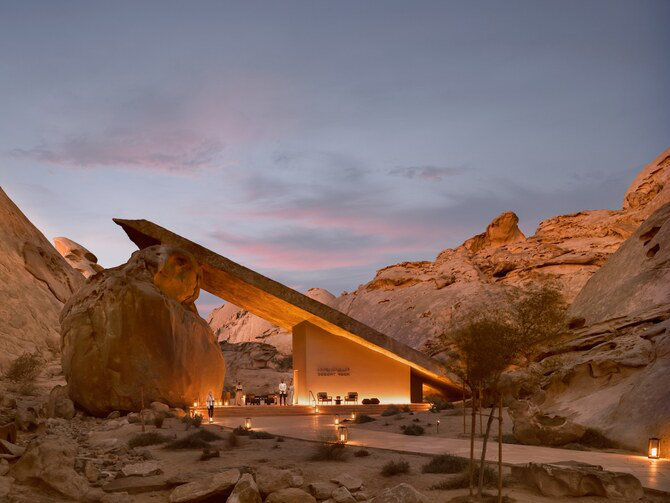
The Desert Rock Resort even repurposed excavated materials, meaning no additional materials were brought in for the main infrastructure.
“We used the mountains’ natural stone for interior and exterior walls and concrete was mixed using local sources of sand and stone,” said Albasseet. “To further reduce on-site disruption and waste, we emphasize pre-fabrication and off-site manufacturing.”
Moreover, Red Sea Global’s hotels and resorts are powered by solar energy, allowing guests to enjoy an eco-friendly destination with a zero carbon footprint.

Albasseet said the backbone of the company’s renewable energy strategy was Red Sea’s vast solar farms, which include hundreds of thousands of photovoltaic panels — more than 750,000 are currently in place.
“These farms generate clean electricity, significantly reducing our reliance on fossil fuels and minimizing our carbon footprint,” he said.
“To ensure a consistent and reliable power supply, even when the sun isn’t shining, we’ve also built one of the world’s largest battery storage facilities at The Red Sea. This … allows us to store excess solar energy generated during the day and use it to power our resorts at night.”
DID YOU KNOW?
• Diriyah, a historic landmark in Riyadh, is being developed sustainably under Vision 2030, earning platinum-level LEED precertification.
• The Farasan Islands, a biodiverse Red Sea archipelago, are being developed for conservation and ecotourism.
• Soudah Development is transforming Saudi Arabia’s southern region into a luxury destination with a focus on ecosystem restoration.
This reliance on solar power extends beyond Red Sea Global’s resorts and hotels.
“It also powers Red Sea International Airport, putting it on track to become the region’s first airport powered entirely by renewable energy,” Albasseet said. “Even our 5G network, a crucial component of modern connectivity, runs on solar energy, making it the world’s first sunlight-powered network.”
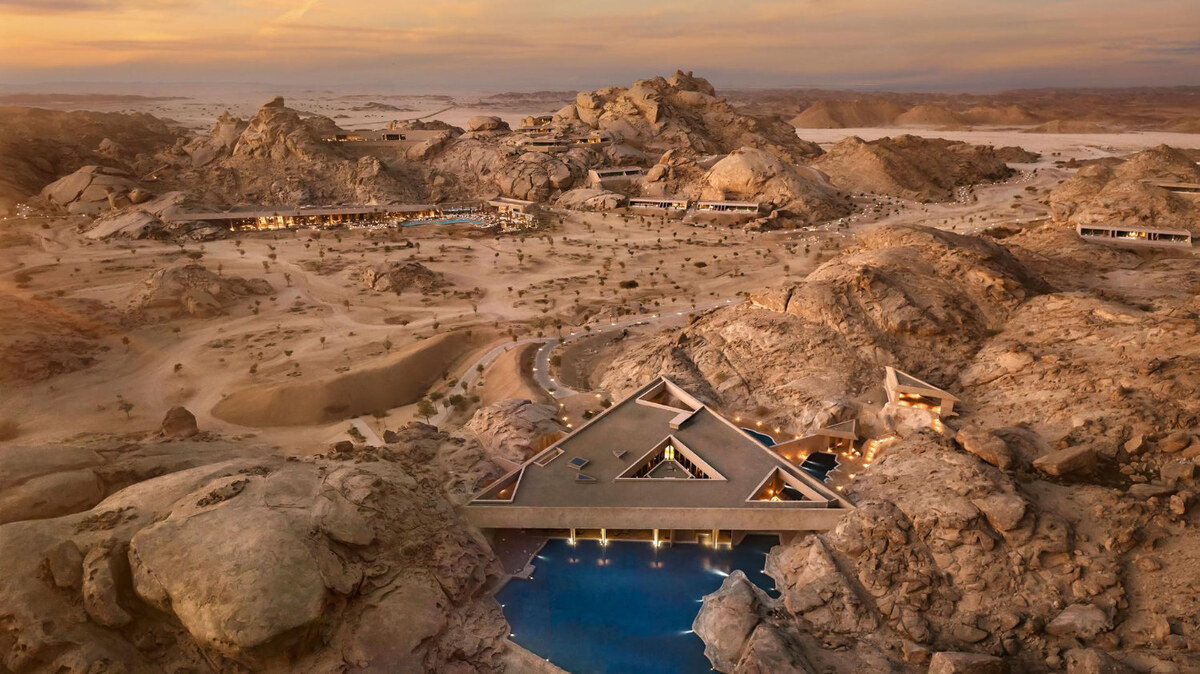
Shebara and Desert Rock, which opened to guests last year, have integrated advanced water systems and water-saving strategies through smart irrigation systems that optimize water use.
“A key element of our water conservation efforts is the implementation of closed-loop systems. Notably, at Desert Rock we have advanced water retention and distribution systems that capture rainwater,” Albasseet said.
“This captured rainwater is being used to sustain the surrounding wadi, revitalizing the local ecosystem and minimizing reliance on external water sources.
“The resort’s design also incorporates water-efficient fixtures and landscaping, further reducing water usage in day-to-day operations. This integration of natural water systems into the resort’s design demonstrates our commitment to working with, rather than against, the natural environment.”

The consequences of unsustainable tourism are far-reaching, ranging from the degradation of delicate ecosystems and biodiversity loss to the exploitation of local communities and cultural commodification. “The current trajectory is simply not viable,” Albasseet said.
“Encouraging sustainable tourism practices is no longer a choice but a necessity for the future of our planet and the travel industry itself … The industry’s contribution to greenhouse gas emissions, estimated at 8 percent globally, underscores the urgent need for transformative change.
“This is not simply about minimizing negative impacts; it’s about actively restoring and regenerating the destinations we cherish.”
Furthermore, he added: “These practices undermine the very foundation of the tourism industry, jeopardizing the natural and cultural assets that attract visitors in the first place.
“The increasing awareness of these issues among travelers, coupled with global commitments like the Paris Climate Agreement and the UN Sustainable Development Goals, further reinforces the need for the industry to embrace sustainability.”

Review: Experience luxury living at Shebara on the Red Sea in Saudi Arabia

- Can the Kingdom’s latest beach resort live up to its eye-watering price tag?
RED SEA: Overwater villa resorts continue to attract holiday goers around the world, but the Kingdom’s latest beach resort, Shebara, on the Red Sea, is breaking the mold with its futuristic designs.
It’s rare that a resort’s architecture is seen as its biggest draw, but that is exactly what Killa Design, the studio behind Dubai’s iconic Museum of the Future, has managed to achieve, with its silver stainless-steel pods that dot the ocean in a necklace-like curve 25 kilometers off Saudi Arabia’s coastline.

Most visitors will arrive from elsewhere in the Kingdom via the Red Sea International Airport. Currently an efficient two-hall operation — until developers build a larger airport set to welcome international flights — beach-ready tourists arrive at Shebara via a 30-40-minute boat ride or a 30-minute seaplane flight that departs from nearby the airport, which currently serves domestic flights from Jeddah and Riyadh.
Sunlight reflects off the resort’s 73 orb-like villas as guests approach, with the mirrored surface of each pod changing from sunlight to sunset. Both the Beach Villas and the Overwater Villas are available with one or two bedrooms.
The resort, which is reportedly powered entirely by an on-site solar farm, has all the amenities you would expect for the SAR9,000 (just under $2,400) nightly price tag (for a one-bedroom Beach Villa), but, as we said, it’s the spacious living spaces themselves that are the highlight. The luxe spa, well-kitted out gym and water sport offerings are really just there to complement the rooms, both the exteriors and interiors of which are worthy of a Bond film.
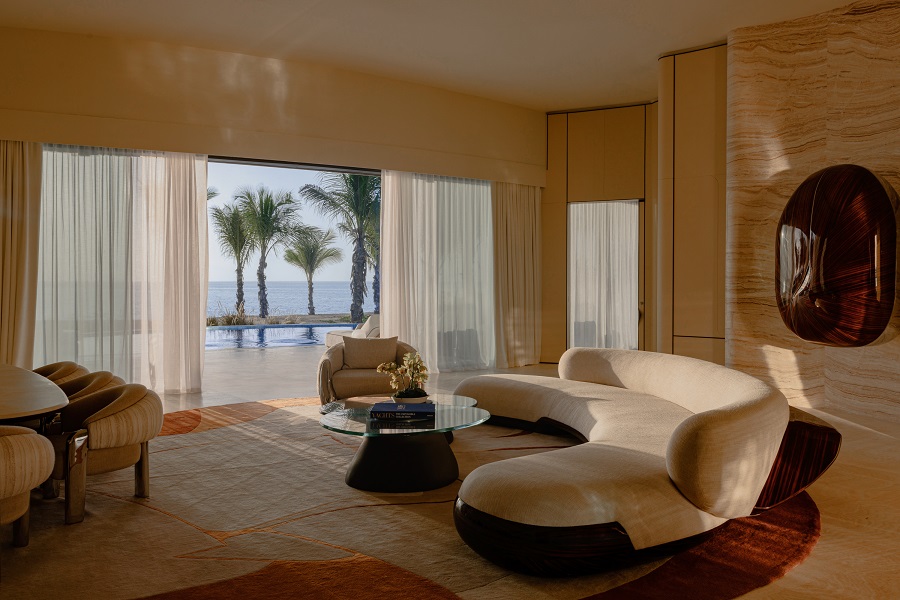
The interiors — by Studio Paolo Ferrari — are a masterclass in experiential living: steel curves, pops of burnt orange, and leather-clad curved walls may not be to everyone’s taste but it’s an experience — one that comes with a reflective button-operated bar that sits like a giant beetle near the living area.
A fully equipped kitchenette is a plus point for guests keen to use the various Nespresso gadgets. Trek over to the bathroom — even the one-bed Overwater Villa is a roomy 188 sq. meters — and you’ll be treated to a free-standing bathtub and separate, curved shower room.
From the lights to the air conditioning and patio doors, it’s all touch screen or button-controlled. Hitting a switch triggers a swoosh as the French doors open to reveal endless blue sea, with a small dipping pool and two outdoor seating areas on a marble-clad deck. For guests seeking a little extra privacy while taking a dip, it should be noted that the overwater villas’ deck pool and sea-skimming overwater hammock area are not shielded from view.
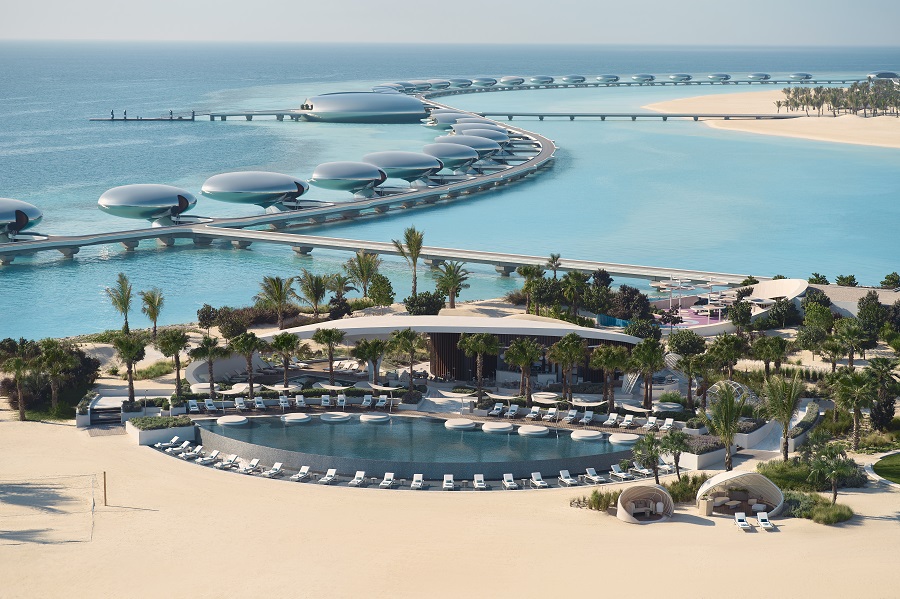
Guests travelling in larger groups are able to reserve an entire islet — the Beachfront Crown Villas Ensemble option, which includes a three-bedroom villa and three one-bedroom villas. The Beachfront Royal Villas Ensemble on the separate Sheybarah Island, featuring a private dock, is also available. This option boasts a four-bedroom villa and three one-bedroom villas.
Walk or catch a buggy through beautifully landscaped soft dunes to the spa and you’ll be treated to a menu of massage, facial and hammam options. The post-treatment relaxation area, with the usual sauna-and-steam room mod cons, is a little on the small side.
Dining options include iki.roe, serving modern Japanese-Nikkei cuisine; Ariamare, led by restaurateur Chef Marco Garfagnini whose menu offers Mediterranean flavors; Lunara, an international brasserie; and Saria Pool Bar & Grill, a beachside venue specializing in Levantine cuisine. Solera, an adults-only pool bar, is the ideal spot to watch a spectacular sunset with a mocktail in hand.
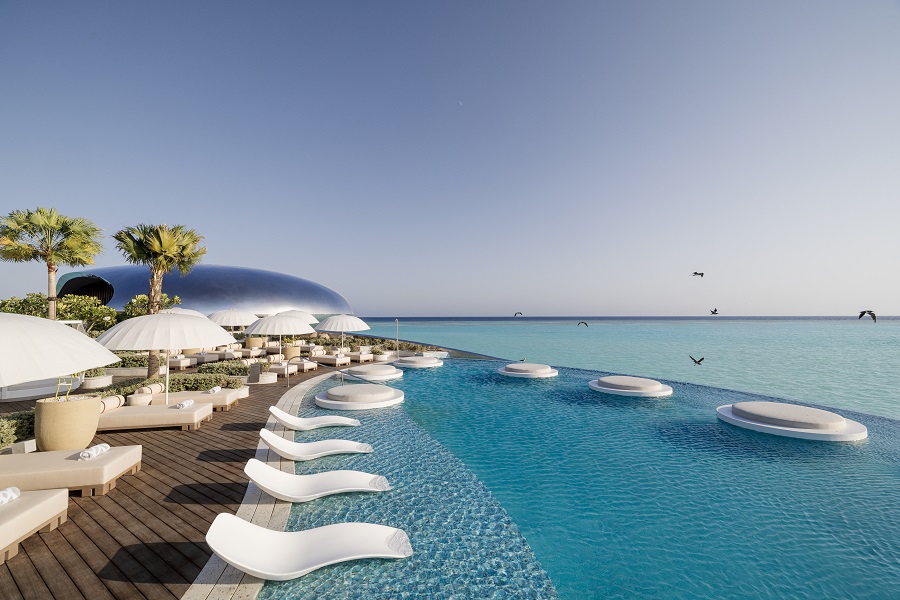
All in all, it’s as luxurious as it gets. But it has to be said that sea resorts do have to contend with more than their fair share of wear and tear due to the weather conditions they face. It is perhaps unfair to expect the resort’s many glass and steel surfaces to be crystal clear and brilliant all the time, but if we were nitpicking — and at this price point, we surely must — more attention could be paid to the details in the public areas as it all feeds into the experience. That being said, the rooms themselves are pristine.
While Mother Nature does battle with the resort’s maintenance staff on a daily basis, she’s also the source of one of Shebara’s most stunning offerings; the snorkeling at this resort is a must as the Red Sea is famous for its diverse marine life, clear blue-green waters and colorful coral.
While there are similar resorts the world over, the architecture and fresh take on beach living make Shebara well worth a visit.
Inside Red Sea Global’s newly opened Desert Rock Resort

RED SEA: As Saudi Arabia expands its portfolio of luxury hotel offerings, the newly opened Desert Rock Resort stands out for its otherworldly terrain and exceptional service.
There will be no quibbling about the benefits of Saudi Arabia versus the Maldives here — an issue that has crept up when potential visitors discuss Red Sea Global’s other outposts, such as the futuristic overwater resort Shebara. When it comes to Desert Rock there is simply nowhere else like it and the resort has leaned in heavily to make use of the spectacular landscape.
Set amid humbling mountains pockmarked with caves, the resort is a 20-minute drive from Red Sea International airport.
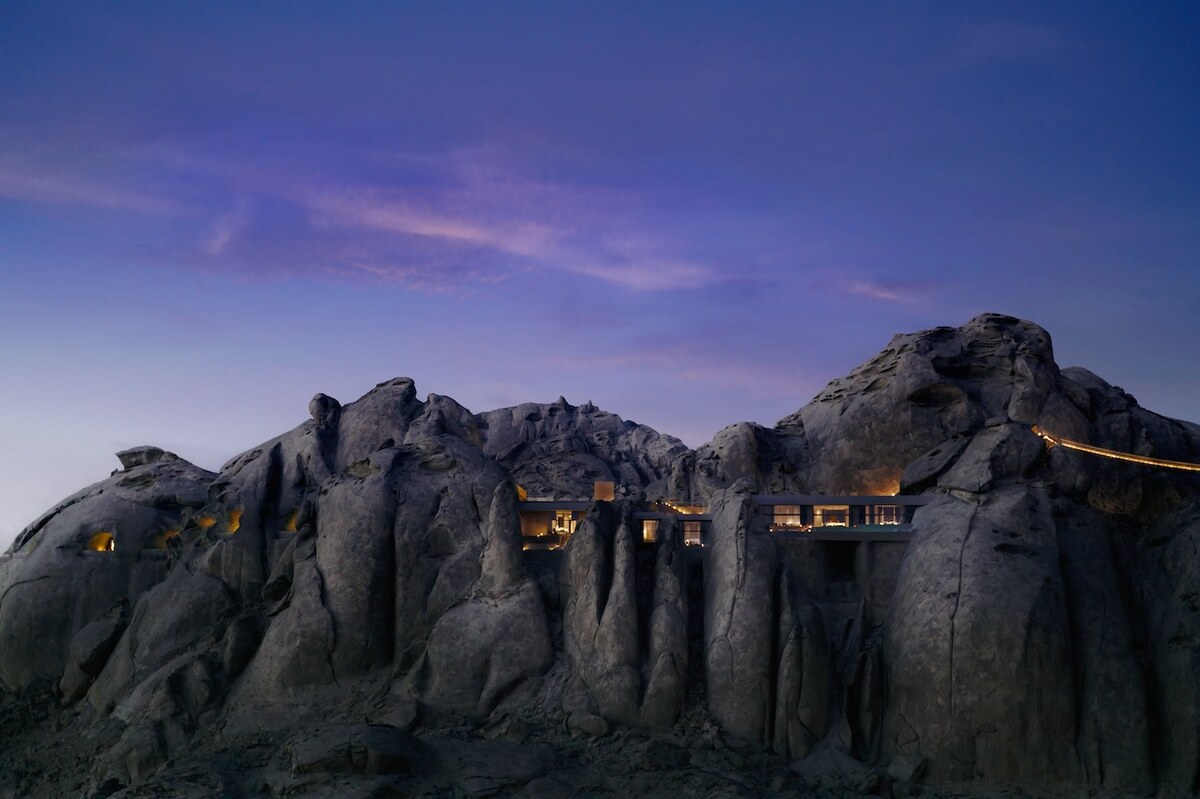
Home to 32 Wadi Villas on the valley floor, 17 Cliff Hanging Villas, four Mountain Crevice Villas, one Royal Villa and 10 Mountain Cave Suites carved into the rockface itself — yes, it’s as mind-boggling as it sounds — the hotel boasts private, temperature-controlled pools in every room and amenities that go a long way to helping guests understand the eye-watering price tag — Dyson hairdryers, Frette sheets and an array of luxe poolside accessories — while an assigned “Villa Host” takes care of your every need via WhatsApp.
While the mountain-top Cave Suites and their views of endless rolling deserts and soaring rust-colored mountains are an influencer’s ticket to viral fame, the two-bedroom Mountain Crevice Skyline Villa is ideal for a larger group — with a conversation-starting bathtub (it fit at least five giddy, fully-clothed adults on our press tour) and glass-ringed fire pit.
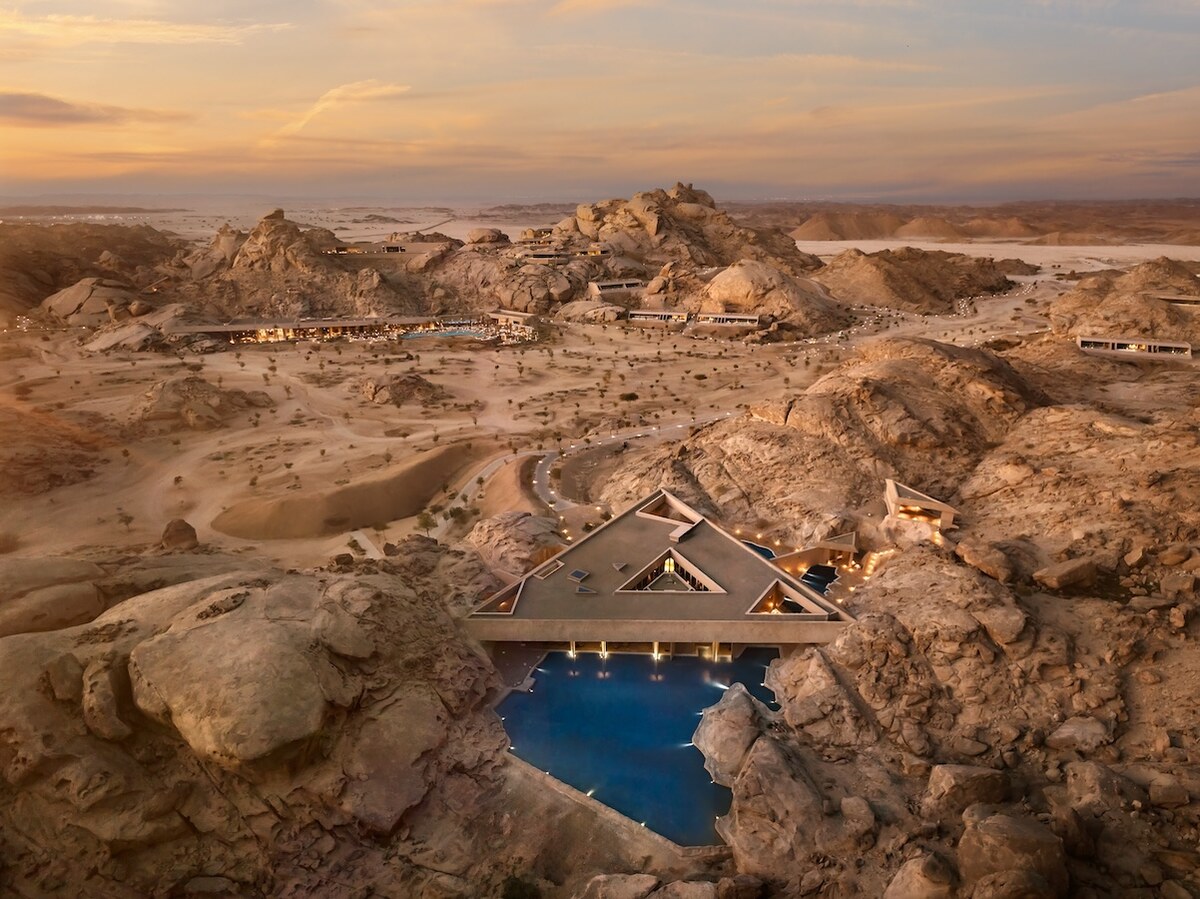
Descend to the valley floor and Oppenheim Architecture’s bunker-like structures melt into the Martian landscape. Use your chic wooden key card — the details are everything at Desert Rock — and you’ll be met by cozy interiors by Toronto’s Studio Paolo Ferrari. Earthy tones, a focus on luxury stone and bronze-brown accents make the large villas and suites opulent without losing the warmth of the desert.
A pool, kids’ club and star-gazing evenings are complemented by the Akun adventure hub, which offers thrilling ziplining, via ferrata, abseiling, rock climbing and archery, with more activities planned for 2025.

A team is on hand to keep visitors safe, but this is no easy experience — we climbed up to the ziplining jump off point on the bare mountain face, at some points resorting to all fours as we followed a rough path hewn into the rock that often became no path at all.
That refusal to bend to lazy luxury is also shown in the 622 steps one can climb to the highest point of the hotel, an observatory reached by crossing a rope bridge at a dizzying height. The lack of a lift was a wise choice –— it may not be easily accessible but that is exactly what makes the astounding view once there so worth it.
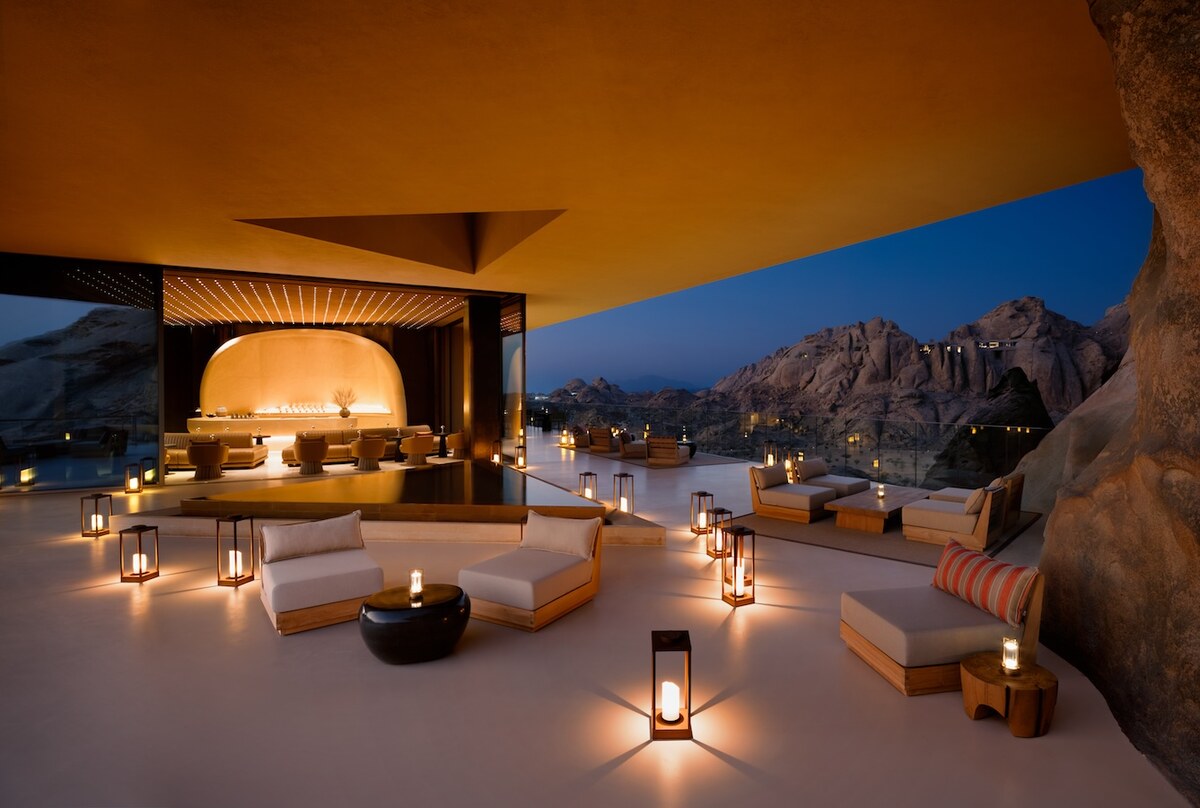
The flipside, of course, is that certain areas of the resort are not accessible for guests with physical disabilities. It’s also important to note that — due to the space this hotel takes up — travel between rooms, restaurants and the spa is usually by buggy.

The four main eateries — NYRA, helmed by Turkish chef Osman Sezener whose restaurant in Bodrum has one Michelin star; MICA, a buzzy mocktail bar that also offers small plates; breakfast spot Basalt, which transforms into an Indian eatery at night; and the poolside Wadi that offers Peruvian cuisine — rival the brightest stars in the Gulf’s major cities, with NYRA and Wadi standing out for their fresh, colorful dishes including tender beef tongue and artfully presented seafood plates. Many of the courses were presented with specific beverage pairings that drew out the flavors of their accompanying dish and pushed experimental mocktails to heights not before experienced by this writer.
Round that all off with a spa that boasts views of soaring, craggy cliffs, as well as indoor and outdoor treatment rooms, a water therapy room and a couple’s hammam room, and you’ve got the ideal recipe for a serene sojourn in the Saudi desert.











